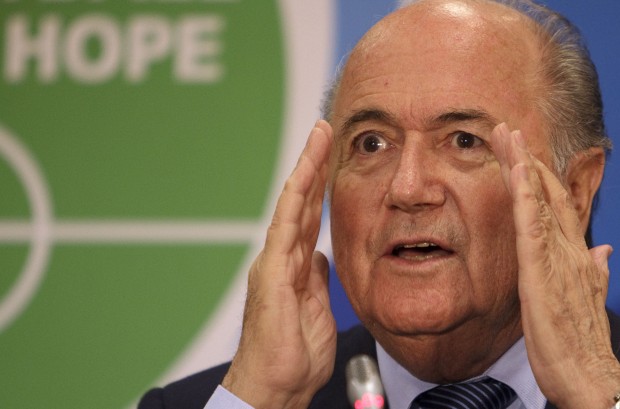
FILE – In this Tuesday, June 23, 2009 file photo FIFA president Sepp Blatter gestures as he speaks at the inaugural ‘Football for Hope Forum’, during the Confederations Cup soccer tournament, at a hotel in Vanderbijlpark, South Africa. (AP Photo/David Azia, File)
RIO DE JANEIRO — A consistent ally of Sepp Blatter, Danny Jordaan already has a new job.
Jordaan, the head of the South African Football Association, was credited with bringing the 2010 World Cup to South Africa. He is also being investigated for $10 million in bribes paid to land the event, part of the corruption scandal that pushed FIFA President Blatter to resign.
READ: Blatter says he will resign as FIFA president
A day after the corruption and bribery scandal broke last week, Jordaan was appointed the new mayor of his South African hometown. He plans to stay on as the soccer federation’s head, a job with no salary. But he’s hedging his bets.
Call it the domino effect, or a chain reaction, or simply bracing for change coming to FIFA.
Blatter is going, so can federation presidents who run world soccer — some like feudal lords in Africa, Asia and Latin America — hang on for long?
Several officials have already been suspended, but experts say they don’t expect massive changes.
Peter Alegi, a historian at Michigan State University and author of “Africa’s World Cup,” said a ‘mild reformer” — not a radical — was likely to succeed Blatter.
“I do not see much of a chance of a domino effect from Blatter’s resignation,” he said in an email. “I believe it’s more likely that the diverse members of the global football establishment will do whatever it takes to hold on to power, privilege, and prestige.”
READ: Former FIFA VP Warner makes televised address in Trinidad
Former Barcelona and Brazil star Romario hopes not.
An outspoken Brazilian federal senator, Romario termed Blatter’s downfall “a big wave that can sweep away” bribery and impunity.
“This is the best news we’ve had in a long time,” Romario said through his social media accounts. “His fall will come as a tsunami to every corrupt leader in confederations around the world.”
Romario singled out Brazil’s authoritarian football leadership, often described as more powerful than the country’s president.
Former Brazilian Football Confederation president Jose Maria Marin is in a Swiss jail awaiting extradition to the United States, and current president Marco Polo Del Nero is keeping a low profile.
Another former president Ricardo Teixeira is under investigation in Brazil for corruption related to bank transfers during preparations for the 2014 World Cup.
“We need the corrupt ones in prison,” Romario said.
Blatter had automatic support in Brazil, home to his 99-year-old predecessor Joao Havelange and host for last year’s World Cup. His real power came from guaranteeing that tiny Caribbean islands, or countries distant from Europe, receive millions in FIFA development money.
FIFA spent about $1 billion on development projects in the last three years — from Zambia to Andorra — and Blatter got the credit, even if not all the money reached the grassroots.
“Sad day for Futbol,” Zambian Football Association President Kalusha Bwalya said on Twitter. “You will always have my support.”
Ibrahim Sanni Darra, a spokesman for the Ghana Football Association, said Blatter’s 17-year reign would be viewed “with nostalgia” and said Africans “will not forget.”
“Before his tenure, Africa had only two slots in the World Cup,” Darra said. “He not only increased it, he also brought the World Cup to Africa.”
New Zealand Football chief executive Andy Martin called Blatter’s resignation “a great day for football.”
“I think we can all get together now and start repairing the tarnished brand of football, and that’s what everybody wants.”
Wilmar Valdez of Uruguay, a vice president of football’s South American governing body CONMEBOL, called Blatter departure a “shock to world football.”
Uruguay, Argentina and Chile were among the South American federations that voted against Blatter on Friday. In previous elections, South America was solid Blatter territory.
“What we were sure of is that sooner or later Blatter’s reign would end,” Valdez said. “FIFA needed change, and now we have to see how the (new) pieces fit.”
Jules Boykoff, who studies sports politics at Pacific University in Portland, Oregon, called Blatter’s resignation an “unexpected shift in the tectonic plates at FIFA.”
“This is a remarkable opportunity to move world football in a very different direction,” said Boykoff, a former professional soccer player, who is lobbying for changes in women’s soccer.
“For decades FIFA has represented a privileged sliver of the global 1 percent; a sexist bastion of power. If there’s ever been a chance to dent that reality, this is it.”